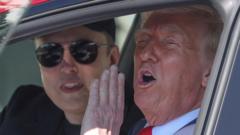Tesla's profits fell over 70% as sales decreased, prompting Musk to reduce his involvement in the Trump administration's Department of Government Efficiency (Doge). Despite facing backlash from political involvement, Musk emphasizes the importance of his government work while expressing concerns about the impact of tariffs and changing political sentiments on Tesla’s future demand.
Musk Cuts Back on Political Role as Tesla Faces Profit Decline

Musk Cuts Back on Political Role as Tesla Faces Profit Decline
Elon Musk decides to downscale his involvement with the Trump administration following Tesla's significant drop in profits and revenues in the first quarter of 2025.
Elon Musk, CEO of Tesla Inc., has announced a preemptive measure to reduce his involvement with the Trump administration in light of significant financial challenges faced by the electric automobile manufacturer. This decision follows a troubling report indicating a dramatic drop in Tesla’s profits and revenues during the first quarter of 2025, with automotive revenue declining by 20% compared to the previous year and a staggering 70% decrease in overall profits.
In recent disclosures, Tesla reported total revenue of $19.3 billion (£14.5 billion), falling short of analyst expectations of $21.1 billion. Musk's political activities, particularly his role in shaping government spending as head of the Department of Government Efficiency (Doge), have drawn criticism and reportedly distracted from the core operations of Tesla.
Acknowledging that his political commitments affected his focus on the automotive branch of the company, Musk stated that he would limit his time dedicated to governmental affairs to one or two days a week. He emphasized, however, that he views his work with Doge as crucial, claiming that "getting the government house in order is mostly done."
Tesla has faced increasing pressure stemming from changing political sentiments and trade policies implemented during Trump's administration. The company noted in its quarterly update that "rapidly evolving trade policy" may negatively impact its supply chain and operational costs, resulting in a potentially significant downturn in product demand.
Despite efforts to adapt—such as slashing vehicle prices to stimulate sales—Tesla has witnessed its number of unit sales dwindle by 13%, marking the lowest sales figures the company has seen in three years. Investment analysts like Dan Coatsworth from AJ Bell have labeled market expectations as "rock-bottom," cautioning that ongoing trade war tensions pose additional risks to Tesla's growth trajectory.
Moving forward, Musk indicated optimism about Tesla's innovations, specifically in artificial intelligence, as a contributor to future growth potential, although investor confidence remains somewhat low. Tesla's shares experienced a slight bump post-earnings report, rising more than 5% in after-hours trading, but the company’s stocks still lost approximately 37% of their value this year as of the market's close on Tuesday. The company must navigate fierce competition and the intricate dynamics of global supply chains if it hopes to recover from its current downturn effectively.
In recent disclosures, Tesla reported total revenue of $19.3 billion (£14.5 billion), falling short of analyst expectations of $21.1 billion. Musk's political activities, particularly his role in shaping government spending as head of the Department of Government Efficiency (Doge), have drawn criticism and reportedly distracted from the core operations of Tesla.
Acknowledging that his political commitments affected his focus on the automotive branch of the company, Musk stated that he would limit his time dedicated to governmental affairs to one or two days a week. He emphasized, however, that he views his work with Doge as crucial, claiming that "getting the government house in order is mostly done."
Tesla has faced increasing pressure stemming from changing political sentiments and trade policies implemented during Trump's administration. The company noted in its quarterly update that "rapidly evolving trade policy" may negatively impact its supply chain and operational costs, resulting in a potentially significant downturn in product demand.
Despite efforts to adapt—such as slashing vehicle prices to stimulate sales—Tesla has witnessed its number of unit sales dwindle by 13%, marking the lowest sales figures the company has seen in three years. Investment analysts like Dan Coatsworth from AJ Bell have labeled market expectations as "rock-bottom," cautioning that ongoing trade war tensions pose additional risks to Tesla's growth trajectory.
Moving forward, Musk indicated optimism about Tesla's innovations, specifically in artificial intelligence, as a contributor to future growth potential, although investor confidence remains somewhat low. Tesla's shares experienced a slight bump post-earnings report, rising more than 5% in after-hours trading, but the company’s stocks still lost approximately 37% of their value this year as of the market's close on Tuesday. The company must navigate fierce competition and the intricate dynamics of global supply chains if it hopes to recover from its current downturn effectively.





















